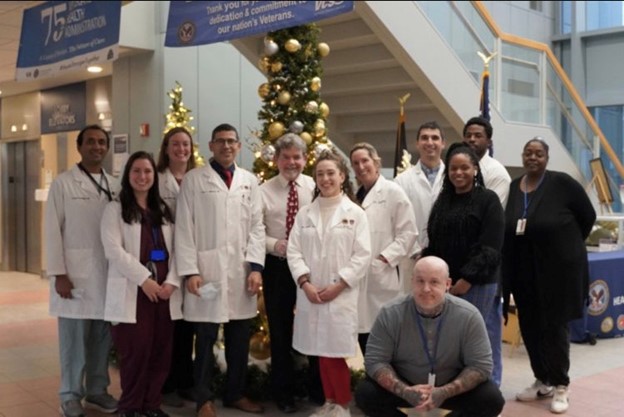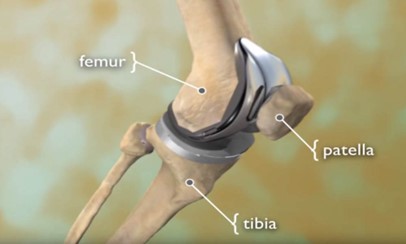Orthopedic Surgery at VA Boston healthcare
Learn about the types of procedures and services offered by Orthopedic Surgery at VA Boston Healthcare
VA Boston healthcare is the primary location for care and treatment of musculoskeletal disorders in the New England area. We work hard to keep you and your bones and joints healthy and well. The combined expertise of our orthopedic specialists allows us to provide you with collaborative, compassionate orthopedic care tailored to your individual needs.

We offer a wide variety of traditional open and minimally invasive surgical procedures for the treatment of many orthopedic conditions including:
- Hip, knee, and shoulder replacement including the innovative anterior hip approach and same-day joint replacement
- Tendon and ligament repairs of the hand, elbow, shoulder, hip, and knee; both basic and complex
- Fracture (broken bone) repair
- Minimally invasive arthroscopic surgery of the shoulder, knee, elbow, and wrist
- Musculoskeletal tumor treatment
What is Total Joint Replacement surgery?
Total joint replacement surgery is intended for patients that suffer from debilitating joint pain due to shoulder, hip, or knee osteoarthritis. The surgeon replaces portions of your shoulder, hip, or knee that are worn out with alloy metal and durable plastic materials. Registry data has shown modern-day joint replacements can last 25 years or more.
Total joint replacement procedures are a good option for veterans who have exhausted non-operative measures, including pain-relieving medicines, bracing, exercise, and injections like cortisone and viscosupplementation. Prior to surgery, your orthopedic surgeon may recommend that you visit your family physician, cardiologist, pulmonologist, or dentist to ensure that your health is optimal for surgery.
Total knee replacement
Total hip replacement
Total Joint Replacement: What to Expect
Total joint replacement procedures are done in the operating room on the West Roxbury campus. Your surgeon will discuss with you ahead of time your anesthesia options available based upon your specific needs. You will also meet with the anesthesiologist before the procedure. Your surgical team includes: an orthopedic surgeon(s), nurses, technicians, and an anesthesiologist.
During the procedure:
- Your surgeon will access your shoulder, hip, or knee through an incision.
- The surgeon inserts cutting guides to precisely remove the arthritic joint surface.
- The surgeon then implants new metal and plastic surfaces that will provide smooth, stable, and pain-free motion.
Total Joint Replacement: Recovery
Most veterans go home in the days after a total joint replacement. You will receive individualized instructions for your care prior to going home. Your doctor will most likely recommend taking aspirin and other drugs (dependent upon your medical condition) to prevent blood clots.
Arrangements are made for visiting nurses and physical therapists to provide care to you in your own home for the first few weeks after surgery.
Two weeks after the procedure, you will need to return to the VA to meet with your Orthopedic Surgeon and team. Shortly thereafter, you will begin outpatient physical therapy.
For more information about total knee, total hip or reverse/total shoulder replacement, visit:
The links above take you to an external web site, the American Academy of Orthopedic Surgery, and do not imply VA endorsement. This information is being provided to help you along with your surgeon, to make informed decisions regarding your care.
Hand / Upper Extremity Orthopedics
The hand consists of bones, joints, ligaments, tendons, muscles, and nerves that work together to perform routine everyday tasks that allow us to touch and contact our world. The frequency with which we use are hands, wrists and elbows makes them prone to injury. Participating in activities and repetitive motions can lead to multiple problems in your hands.
What we treat here at VA Boston Healthcare:
- Nerve Disorders
Carpal tunnel syndrome and cubital tunnel syndrome are the most common nerve compression disorders. 4-10 million Americans experience these nerve problems at some point in their lives. Nerve disorders can cause numbness and tingling and burning pain into your fingers. We provide conservative treatment and minimally invasive surgery to relieve pressure on your nerves.
- Dupuytren's Contracture
In this disease, also known as the Viking Disease, the fingers contract (or curl up) towards the palm. It is caused by a build-up of collagen that forms a cord beneath the skin in the palm. Over time, the cord thickens, causing the fingers to bend or curl more and limits your ability to straighten your fingers. We provide treatment to get rid of the cord and straighten your finger with either an injection or surgery
- Thumb Arthritis
Approximately 40% of Americans have the potential to develop arthritis at the base of the thumbs. This causes sore, painful joints that interfere with your ability to complete day-to-day tasks such as pinching and gripping (i.e. turning keys, opening water bottles and holding a phone). We provide non-operative and operative care to help reduce your pain and restore your quality of life.
- Fractures/Dislocations
Broken bones or dislocated joints are common injuries that occur during falls, sporting accidents, or motor vehicle collisions. A fracture (break) of the radius (wrist) and the 5th metacarpal (bone that supports your little finger) are two of the most common bones broken in the hand and wrist. We can provide treatment to help heal your fracture with a cast or surgery, if necessary. We can also help with rebuilding your motion and strength after healing by working with our hand therapists.
- Trigger Finger
This is a condition that makes it difficult for you to bend and/or straighten your fingers. This occurs when there is inflammation/swelling that builds up in the tunnel (sheath) that covers the flexor tendons. We provide treatment to reduce the inflammation (injections) or release the tunnel (surgery) to help improve your pain and motion.
- Ganglion Cysts
These are small lumps that develop on the tendons or joints of your wrist and/or fingers. They can resolve on their own. When they don’t, we can provide treatment. Never try to drain them yourself as that can cause an infection into your joint. Treatment can be with splints or braces. We can occasionally aspirate (drain) the cyst or perform surgery to remove them.
- Tendon Injuries
Feeling a “pop” or rupturing a tendon will affect the ability to move your fingers, wrist, or elbow. It is important to seek care urgently to have this tendon repaired. We are able to repair your finger flexors – that bend your fingers, finger extensors – that straighten your fingers, wrist tendons, biceps, triceps etc.
- Wrist Arthroscopy
We can perform wrist “scope” similar to a knee scope where we look inside the wrist. This allows us to better diagnose your wrist problems and treat them.
How to Make an Appointment
If you aren't currently being seen by one of our orthopedic surgeons, you can be referred by your Primary Care Provider for an initial consultation. If you are already being followed by Orthopedic Surgery, please call the clinic directly
Learn more about your Orthopedic surgeons at VA Boston healthcare system


